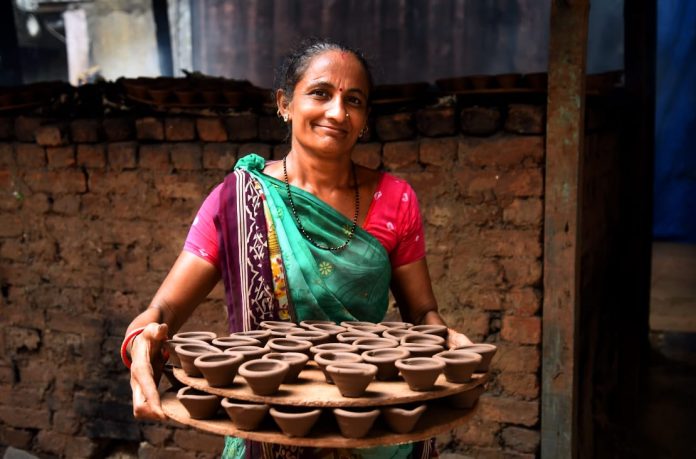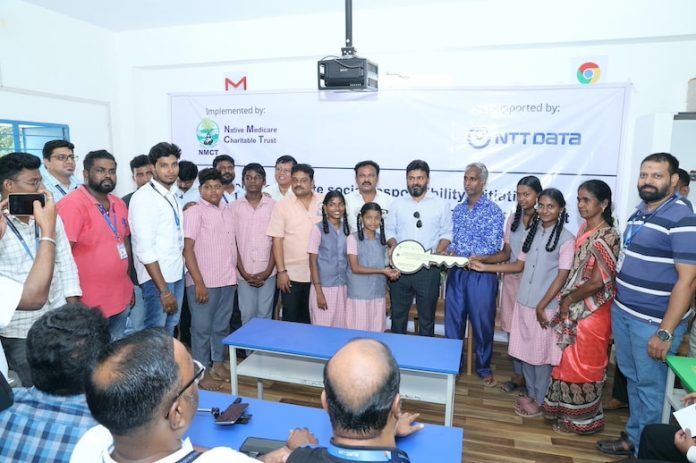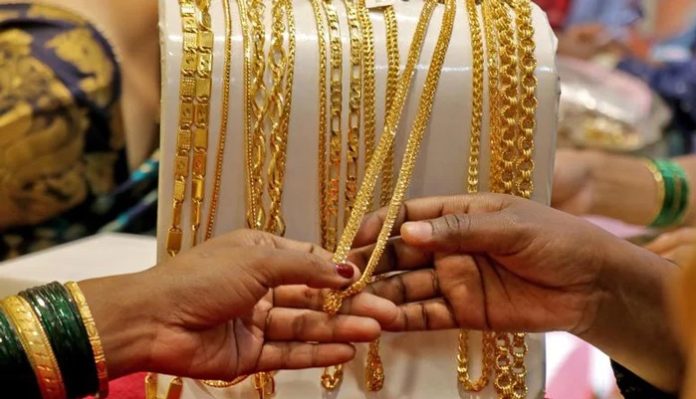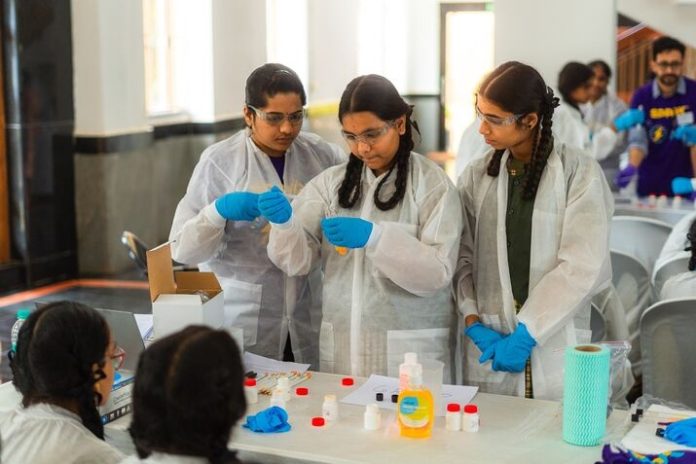धारावी की दीयों से जगमगाएगी दीवाली, मुंबई एयरपोर्ट को करेगा रोशन
पूरे देश भर में दीपावली उत्सव की धूम है। बड़े ही हर्षोउल्लास के साथ दिवाली (Diwali) मनाने की तैयारी जारी है। बाजारों की रौनक देखते बन रही है। ऐसे में दिवाली के दिये को लेकर सब यही अपील करते नज़र आ रहे है कि दीयों की खरीदारी अपने आसपास के बाज़ारों से करें। ताकि रौशनी के इस पर्व में उस कुंभार की भी दिवाली रोशन हो सके। यही कारण है कि धारावी सोशल मिशन, धारावी पुनर्विकास परियोजना प्राइवेट लिमिटेड (Dharavi Redevelopment Project Private Limited) की एक पहल ने इस दीवाली के लिए धारावी (Dharavi Latest News) के कुम्भारवाड़ा से लगभग 10 लाख दीयों की बिक्री की व्यवस्था की है। ये दीये मुंबई अंतरराष्ट्रीय हवाई अड्डे में यात्रियों की सहभागिता कार्यक्रम और अदानी फाउंडेशन (Adani Foundation) की जागरूकता अभियानों में उपयोग किए जाएंगे।
दिवाली को लेकर धारावी में अदानी फाउंडेशन की अनोखी पहल
करीब 500 कारीगर, जो पीढ़ियों से दीये बनाते आ रहे है और जो इस कला में लिप्त हैं उनके साथ मिलकर लगभग 10 लाख हस्तनिर्मित दीये तैयार किए हैं। कुम्भार वाड़ा के लिए, यह सिर्फ एक ऑर्डर नहीं है यह उनकी जीवन रेखा है। यह गर्व का क्षण है, जहां उनकी विरासत को न केवल संरक्षित किया गया है, बल्कि इसे बड़े पैमाने पर मनाया भी गया है। कुम्भार वाड़ा कुम्हार संघ के सदस्य हनीफ गलवानी ने इस पल की भावना को व्यक्त करते हुए कहा कि यह हमारा सबसे बड़ा आर्डर है। डीआरपीपीएल से मिला समर्थन हमें अपनी परंपराओं को जीवित रखने के लिए सशक्त बनाता है। यह केवल दीये बेचना नहीं है, बल्कि हमारी विरासत को आगे बढ़ाना है।
कुंभारों को मिलेगा आर्थिक मदद, मुंबई एयरपोर्ट होगा रोशन
हर दीये के पीछे एक समुदाय सहयोग की कहानी है, जहां युवा हाथ अनुभवी कारीगरों के साथ मिलकर दिवाली की आत्मा को जीवन में लाते हैं। धारावी की गलियों की नरम मिट्टी से लेकर शहर भर में घरों की रोशनी तक, ये दीये उस समुदाय की प्रेम, कौशल और आत्मा को अपने में समेटे हुए हैं, जो हमेशा से मुंबई की धड़कन रहा है। यह पहल डीआरपीपीएल के एक बड़े दृष्टिकोण का हिस्सा है, जिसका उद्देश्य स्थानीय व्यवसायों को सशक्त बनाना और धारावी में पारंपरिक शिल्पकला को संरक्षित करना है। ऐसे समय में जब मशीन से बने और आयातित सामान बाजार पर हावी हैं, यह बड़े पैमाने पर हस्तनिर्मित मिट्टी के दीपकों का आर्डर भारतीय कारीगरों और उनके निर्माण को बढ़ावा देता है।
क्या है धारावी सोशल मिशन
धारावी सोशल मिशन (Dharvi Social Mission) धारावी रिडेवेलपमेंट प्रोजेक्ट प्राइवेट लिमिटेड (डीआरपीपीएल) की एक प्रमुख पहल है, जो धारावी के निवासियों के सामाजिक, आर्थिक और बुनियादी ढांचे के विकास को बढ़ावा देने के लिए समर्पित है। इस मिशन का विशेष ध्यान युवा, महिलाएं, उद्योग और धारावी के वंचित समूहों पर है। प्रयासों का ध्यान कौशल-आधारित रोजगार, शिक्षा, स्वास्थ्य देखभाल और स्वच्छता, सामाजिक सहभागिता और सामुदायिक कल्याण को बढ़ाने पर है। धारावी सोशल मिशन समुदाय की जीवन गुणवत्ता में सुधार, व्यक्तियों को सशक्त करना, स्थायी आजीविका को बढ़ाना और सभी के लिए एक उज्जवल, अधिक लचीला और समावेशी भविष्य बनाने के लिए प्रतिबद्ध है।
CSR partnership with Foundation for Development Initiative for a cleaner Haryana
Jind, India: As part of its commitment to driving sustainable growth for communities, PNB MetLife, in partnership with the Foundation for Development Initiative (FDI), has launched an innovative Crop Residue Management (CRM) program in Jind district, Haryana. This initiative addresses the one of India’s most pressing environmental issues of stubble burning, while empowering local farmers with eco-friendly alternatives to stubble burning that create long-term economic value.
This partnership builds on PNB MetLife’s mission to support big dreams; in this instance, by fostering environmental responsibility and economic empowerment. The project aims to benefit 2,000 farmers, cover 3,500 acres of farmland, and prevent the burning of stubble worth ₹1 crore, while significantly reducing air pollution, by preventing more than 5,000 tonnes of stubble from burning and averting the release of 8 million kilograms of greenhouse gases (GHGs). The initiative seeks to raise environmental awareness, promote greener farming practices, and enable rural women by converting crop residue into marketable products.
Key highlights of the initiative include:
80 awareness sessions, 200 focus group discussions (FGDs), and ~ 2,000 to 4,000 personalized interactions with farmers to promote sustainable practices.
Establishment of small manufacturing units for 30-50 rural women to create market-ready products from crop residue, supported by market linkages for profitability.
Implement sustainable solutions in 20 villages until March 2025, with a plan to expand the coverage to more regions in the future.
Deployment of a mobile application to streamline stubble collection and disposal, further enhancing project efficiency.
Sameer Bansal, Managing Director & CEO of PNB MetLife, said, “At PNB MetLife, we are driven by the belief that our purpose: Milkar Life Aage Badhaein means securing the future by investing in the dreams and aspirations of the communities we serve.”
“Our partnership with FDI marks a significant step towards this goal, by addressing the issue of stubble burning, which is not only harmful to our communities, but wasteful. The CRM program offers farmers practical and profitable alternatives that support both environmental preservation and economic upliftment.
“We are also focused on empowering Women SHGs to transform agricultural waste into income-generating products, fostering entrepreneurship and creating sustainable livelihoods for rural women, which in turn drives economic independence and community-level progress. I We hope to drive lasting change in Haryana and pave the way for similar initiatives across the country.”
Vijay Singh, CEO of FDI added, “Our focus is on empowering farmers with the knowledge and tools they need to transition to environmentally friendly practices. This project not only helps reduce environmental damage but also creates economic opportunities, particularly for women farmers, who will be trained to turn waste into valuable products. Together with PNB MetLife, we are setting the foundation for a sustainable, replicable model that benefits both people and the planet.”
Disclaimer: This media release is auto-generated. The CSR Journal is not responsible for the content.
Indian School of Hospitality announces initiative to raise awareness on sustainability, reusing, and repurposing
Gurugram, India: The Indian School of Hospitality (ISH) is delighted to announce Embell-ISH-ED, a unique initiative to raise awareness on sustainability, reusing, and repurposing.
The endeavour was unveiled during the International Chefs Day celebration at the ISH campus in Gurugram. The occasion witnessed the presence of over 300 participants, in addition to students, enthusiastically engaging in numerous activities and competitions.
Moreover, 80 celebrated chefs from leading brands across the country took part in the event, demonstrating their culinary skills and guiding students via interactive workshops.
‘’We are extremely proud of our students, faculty and guests for their dedication and imagination in making this event a grand success. Through Embell-ISH-ED we aim to make a substantial difference in the lives of individuals from marginalised sections, while also educating our students and community on the significance of sustainable practices. The initiative truly embodies the ethos of ISH, where education fuses compassion and innovation,’’ said Mr. Kunal Vasudeva, Co-Founder & Managing Director, Indian School of Hospitality.
The celebration commenced with a series of captivating activities and competitions designed to highlight culinary talents and creative skills. The U.S. Poultry master class led by the renowned Chef Babu Nagarajan offered the participants an insightful session on the intricacies of poultry preparation, sustainable practices, and innovative cooking approaches.
The zeal continued with FROST & FUN, a fascinating cupcake decorating competition where participants expressed their creativity in the pastry kitchen. Under the guidance of Chef Shikha, Prabnoor, and Shrishti, the competitors designed remarkable cupcake designs, impressing the judges with their artistic talents and attention to detail.
Following this, the delightful cooking competition, A TASTE OF NOSTALGIA, brought together aspiring chefs to prepare beloved traditional dishes. Chef Aabir, Ira, and Yogesh delivered valuable support, ensuring the participants had everything they required to produce delectable creations. The judges, including Ms. Anuradha Agnihotri and Chef Aryan, were left amazed by the culinary proficiency on display.
Another key highlight of the occasion was the presentation of the Mister Tikku prize, which included a cash award of Rs 25,000, to Ms. Shreya Jaggi for her outstanding performance and remarkable entrepreneurial efforts. Mister Tikku is a frequent collaborator and a strong supporter of the ISH family.
Blending an element of adventure, the Treasure Hunt for the Chefs allowed participants to embark on a thrilling journey across the ISH campus. Coordinated by Chef Sana Khan, Pranav, and Siddhima, the hunt challenged the chefs to decode clues and complete tasks, boosting teamwork and fellowship.
In addition, creativity took centre stage with MOULDING MAGIC, a workshop led by Chef Piyush and Harshita where attendees availed of the opportunity to craft stunning pottery pieces under expert guidance. Simultaneously, the COLORS OF IMAGINATION painting competition enabled partakers to display their creative talents on canvas, producing a lively collection of artworks.
‘’The multifarious range of activities and competitions underscored the spirit and dedication to excellence that we cultivate at ISH. We are delighted to see the chef and student community coming together to support such noble causes, make a lasting impact across communities, and drive positive change. The entire event was meticulously curated and executed by our talented Semester 5 culinary students. We also owe a huge thanks to our incredible sponsor partners, without whom none of this would have been possible,” said Chef Zubin D’souza, Dean Culinary Studies, Indian School of Hospitality.
The evening extravaganzas kicked off with the COSTUME CARNIVAL, a fancy-dress competition that showcased the playful and inventive side of the partakers. The event featured an array of dazzling costumes, judged by Ms. Usha Nair and Mr. Deepak Sharma. Reiterating the commitment of ISH towards sustainability, the Best Out of Waste competition spotlighted functional items composed of recycled materials.
Notably, every aspect of the festivity was a testament to sustainable practices and efforts, including the decor, food, and even the artwork.
With the onset of the evening, the Jam Session and Diwali Mela & DJ Celebration spellbound everyone with spectacular performances and a festive atmosphere with music, dance, and scrumptious food from student-run stalls. The vibrant mela also offered a strategic platform for small businesses and vendors to showcase their talents to a wider audience.
The entire profits generated from the event will go towards feeding less fortunate families, primarily migrant workers, as part of ISH’s ”Hunger Project” initiative.
Through this endeavour, ISH is devoted to reducing nutrition induced mortality and impaired development among these children. The institution also features a brand of street-style inspired snacks, Peck-ISH, a collection of delectable treats that are operated out of two food carts. All profits from these sales support the Hunger Project.
The project has received phenomenal support from a diverse range of industries. Prominent brands such as Nestle, Balmer Lawrie, Chemkraft, Sharp Sight Eye Clinics, Elle and Vivre, among others, have consistently provided assistance to contribute to its success and ensure a substantial impact on underserved communities.
Disclaimer: This media release is auto-generated. The CSR Journal is not responsible for the content.
PIL in Supreme Court seeking clarity on GST for Mental Health Services
New Delhi, India: A 17-year-old Delhi student and founder of The Mind Canvas, Anvi Kumar, a student of The Shriram School Aravali, Gurgaonhas filed a Public Interest Litigation (PIL) with the Supreme Court of India. The petition challenges the lack of transparency in the government’s categorization of mental health services within the Goods and Services Tax (GST) framework.
This legal move follows an RTI application filed by Anvi on September 13th, which sought clarification from the National Institute of Mental Health &Neurosciences (NIMHANS) in Bangalore. The response received, however, provided limited information, leaving essential questions on the process and considerations behind the 18% GST rate on mental health services largely unanswered.
Key questions raised included whether the government conducted research or engaged with stakeholders before implementing the tax, and whether considerations were made regarding the impact on affordability and accessibility of mental health care.
Furthermore, a response stating ‘GST is generally not applicable to Mental Health Services’ was attached to a query probing if any mental health services are exempt from the 18% GST rate, raising concerns over the varying perceptions around the matter.
Among the responses, NIMHANS noted that “GST is generally not applicable to Mental Health Services,” creating a notable ambiguity, as other responses did not align with this statement, underscoring the need for policy clarity. The absence of specific information also highlighted a possible gap in research or stakeholder engagement on the taxation of mental health services.
Alongside the PIL, Anvi has launched a Change.org campaign to build awareness and gather support for transparent policies that prioritize mental health affordability and accessibility.
Through this Public Interest Litigation, The Mind Canvas and Anvi Kumar aim to push for clearer, more informed government policies that prioritise mental health care and ensure its affordability and accessibility for all. Clear classification is crucial to ensuring that these essential services are treated appropriately, reflecting their importance in overall healthcare. Hence, Anvi is also running a Change.org campaign to raise awareness and garner support at https://chng.it/7jGPCLGS27.
Disclaimer: This media release is auto-generated. The CSR Journal is not responsible for the content.
What are the Monitoring Agencies of CSR
CSR has become a fundamental component of modern business practices especially in India where the government has made it mandatory for any profit making organisation. The purpose is to make corporates contribute to social welfare, benefit backward and underprivileged communities – be it their education, healthcare, skill development or basic needs, and at the same time doing something for environmental sustainability.
Regular monitoring and evaluation of Corporate Social Responsibility (CSR) programmes and initiatives help to ensure that the projects attain their goals and create an impact. This is also necessary to help companies measure how much is the impact of their CSR goals, research on investments, and generate an evidence base. Monitoring of CSR activities enhances a company’s credibility in front of stakeholders.
What are the agencies that monitor CSR activities in India? The CSR Journal takes a look.
Why monitoring CSR activities is necessary
Monitoring the CSR activities of a company is necessary for the following reasons:
Helps to assess impact
Assessing the impact of CSR programmes and initiatives is necessary to understand their effectiveness and the extent to which they accomplish the proposed goals. Impact assessment involves systematically measuring the outcomes and changes resulting from CSR activities. This practice helps companies understand whether their CSR initiatives are creating any positive social, environmental, and economic impact.
Ensures Accountability and Transparency
Monitoring CSR initiatives enhances accountability and transparency, which are significant for building trust with stakeholders, including employees, customers, investors, and the community. Accountability ensures that companies adhere to their CSR commitments and are held responsible for their actions, while transparency involves openly sharing information about CSR efforts, successes, and challenges.
Regularly publishing detailed CSR reports (which is often included within the Integrated Annual Report of a company) allows stakeholders to see the progress and impact of Corporate Social Responsibility initiatives. These reports should include clear metrics, methodologies, and results, along with explanations of any shortcomings or failures to implement a particular CSR project. Transparency in reporting helps to build trust and credibility, which delivers a message to the stakeholders that the company is sincere in its efforts.
Helps in planning future CSR initiatives
Monitoring and evaluation provide useful insights that help in the planning and execution of future CSR initiatives. By analyzing the data collected, companies can identify trends, successes, and areas for improvement. This information enables businesses to make data-driven decisions, ensuring that resources are allocated efficiently and that future initiatives are designed to maximize impact.
However, monitoring CSR is not devoid of its share of challenges such as Complexity of Measurement, Data Collection and Management, Resource Constraints and difficulty in engaging Stakeholders.
Monitoring agencies of CSR
Corporate Social Responsibility (CSR) activities are monitored by multiple agencies including the government and third-party agencies. Some companies also monitor their own CSR initiatives and programmes.
1.Government of India
In India, the Central Government monitors the CSR provisions compliance through the disclosures made by the companies on the MCA 21 portal of the Ministry of Corporate Affairs (MCA). The Government of India has the authority to take action against the non-compliant companies for any violation of CSR provisions.
The Ministry of Corporate Affairs (MCA) has several mechanisms to monitor Corporate Social Responsibility (CSR) activities in India. These include the National Foundation for Corporate Social Responsibility (NFCSR), Comptroller & Auditor General (C&AG) and the Parliamentary Committee on Public Undertakings (COPU).
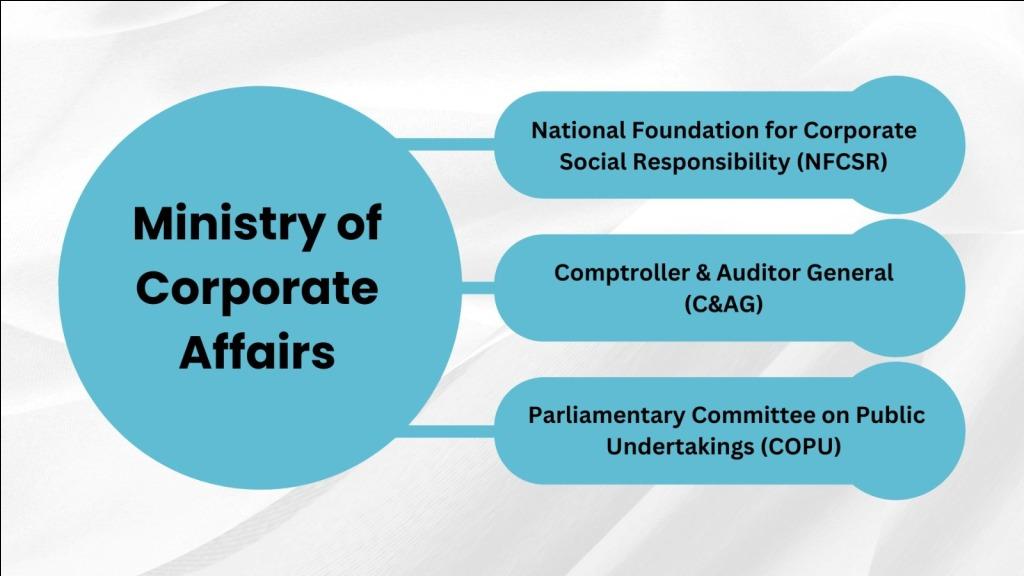
National Foundation for Corporate Social Responsibility (NFCSR)
National Foundation for CSR is an apex National Institution being housed at the Indian Institute of Corporate Affairs (IICA). It has been established to build an enabling environment for the corporate sector to work in collaboration with Government and civil society organization for effective contribution towards sustainable growth and development. NFCSR has been evolved as a national level institution that can effectively enable and inform the spirit of CSR legislation.
NFCSR not only provides research support to the MCA but also advocates for policy and helps to create a conducive environment for the corporate sector so that it is able to work with the government and civil society and contribute to a sustainable growth.
Comptroller & Auditor General of India (C&AG)
Mandated by the Constitution of India, Comptroller & Auditor General of India (C&AG) promotes accountability, transparency and good governance through high quality auditing and accounting and provides independent and timely assurance to the Legislature, the Public and the Executive, that public funds are being collected and used effectively and efficiently. The C&AG audits CSR policies with a focus on the expenditure of Public Sector Undertakings (PSUs).
Parliamentary Committee on Public Undertakings (COPU)
The Committee on Public Undertakings examines the reports and accounts of Public Sector Undertakings (PSU.) The functions of this committee are mentioned in the fourth schedule of the Rules of Procedure and Conduct of Business in Lok Sabha. The COPU conducts horizontal studies on the CSR of PSUs.
2.Third-party agencies
Third party agencies independently monitor and evaluate CSR projects. Their job is to make sure that projects are implemented as planned and achieve their desired impact.
For example, Consultivo is CSR Project Monitoring and Evaluation Consultancy which carries out Independent Midterm (or Midline) and End line Monitoring and Evaluation (M&E) of CSR and other development projects in India during its entire life cycle. The company ensures that the projects are executed as per the plan.
ITAD’s independent monitoring and verification services make sure that the reported results are reliable, ensuring that programmes are achieving the expected outcomes and delivering for end users.
Another agency SoulAce has been working in the space of Monitoring for a long time and has an established approach, methodology and supportive tools. Their approach focuses on either obtaining Key Performance Indicators (KPIs), budget and timelines from MoU or formalizing the same with CSR and NGO team at the beginning of the project.
This is followed by check-in with NGO team and working with them to ensure the project progresses as per the planned timelines and budget to meet the committed KPIs. This agency also interacts with CSR team to update on the project specific progress and send formal updates on regular basis. It also works with CSR departments to ensure that all the information required for regulatory compliance is also available to them.
3.Companies
Some companies monitor their own CSR activities instead of being dependent on others. This is normally done through regular progress reports, staff performance monitoring, and other techniques.
For example, companies like Larsen & Toubro, Wipro, Hindustan Unilever Limited, Tata Consultancy Services, Vedanta, Axis Bank, Bajaj Auto Ltd, Grasim Industries Ltd, HDFC Bank, ICICI Bank Ltd and HCL Technologies monitor their own CSR activities.
Companies which fall under Section 135 of the Companies Act, 2013 must file Form CSR-2 to report their CSR activities. This has been made compulsory since 2021-22. This is an additional form apart from the annual financial statements filed by the organisation through Form AOC-4.
As instructed by the Ministry of Corporate Affairs, companies undertaking Corporate Social Responsibility also mandatorily have to disclose their CSR activities undertaken in the said financial year in their integrated Annual Report. This should also include details about how much money have been spent on a particular project and the areas in which it is operational, implementing agencies if any for a specific CSR programme, and the project’s impact like how many individuals benefitted through the project in a given FY.
4.External Auditing Firms
External Auditing Firms calculate the return on investment (ROI) for CSR projects every six months. This is done until at least five years after the project’s completion.
For example, Green Edge Compliance Group Private Limited (Grecom) is a CSR, Social Compliance and QHSE Company. Grecom provides independent services ensuring business sustainability and have a global benchmark for CSR, Social Compliance, Integrity, Human Resources and QHSE for Food and Non Food Manufacturers, retailers and importers, who are engaged in Indian and International business. Grecom assists them to work in adherence to Indian industry, the Food Safety and Standards Authority of India (FSSAI) and international regulations and norms.
Conclusion
Monitoring, evaluation, and reporting of a CSR project are necessary for the successful implementation to ensure that the said project achieves the required objective. It is also equally important to ensure that the project makes the desired impact. Therefore monitoring of CSR initiatives should be done at regular intervals.
India Lost Rs. 120 Cr to Digital Arrest Frauds This Year
Suppose your phone rings and on the other side is an officer from CBI. The officer charges you to be part of a massive drug chain and a consignment or parcel is about to reach your home, which the officer needs to seize. You deny your involvement in any such illegal activity, but the officer asks you to follow him. The officer further suggests that you constantly remain on video conferencing through Skype or any other platform to be under his surveillance.
This situation typically makes up a new form of cybercrime called a ‘digital arrest’. The situation of a digital arrest involves a fraudster calling you by the name of an officer from the CBI, FBI, ED, TRAI, etc. The fraudster then approaches the intended target using audio or visual calls. The first step is to intimidate people and the second step is to extort money from them while confiding them to one location physically, usually the victim’s own house. This creates a situation of false pretence of an arrest in a digital form, and hence the cybercrime is called a ‘digital arrest’.
Digital Arrest Frauds in India
Prime Minister Narendra Modi, in the first quarter of the year 2024, highlighted that India has lost approximately Rs.120.30 crores in digital arrest frauds. According to the data from the Ministry of Home Affairs, digital arrests have become a prevalent method of digital fraud lately. The ministry also monitors the Indian Cybercrime Coordination Centre.
The base for many such frauds comes out to be Southeast Asian countries, like Myanmar, Laos and Cambodia. Approximately 46% of cyber frauds reported between January to April this year were from these three countries. The total value of money lost by victims can be estimated to be touching Rs.1,776 crores.
Data from the national cybercrime reporting portal also showed that Rs. 7.4 lakh complaints were made between January to April while Rs.15.56 lakh complaints were received in 2023. A year before in 2022, Rs.9.66 lakh complaints were reported, which was higher than the figure of Rs.4.52 lakh complaints reported in 2021. These trends point towards the growing magnitude of cyber arrests in India.
The targets for these crimes are chosen very carefully and would be contacted over Skype or other video calling platforms, which can secure the identity of the caller. According to the Cyber Fraud Mitigation Centre situated in New Delhi (also called 14 C), there are four categories of digital scams. These include digital arrests, trading scams, investment scams, and romance scams. The daily newspaper Indian Express reported the official court of the chief executive officer of 14C, Rajesh Kumar, who revealed the surprising figure of money lost in all the scams,
“We found that Indians lost Rs.120.30 Cr in digital arrests, Rs. 1,420.48 Cr in trading scams, Rs. 222.58 Cr in investment scams and Rs. 13.23C in Romance scams.”
“The cybercrime operations based in these countries employ a comprehensive array of strategies, including recruitment efforts by exploiting social media to lure Indians with fake employment opportunities.” Kumar added further.
Security from Digital Crime
The space for physical and mechanical mobility has been taken up by the digital world. This has increased the ambit of digital platforms. Everything from rural benefit transfers to Aadhaar cards has been digitised. It then becomes important to ensure personal security.
This can be done by using strong passwords and multi-factor authentication in all your bank accounts and digital devices. It can come out to be less convenient for personal use, but given the increasing cybercrime, this is the only way out. In case of theft or data breach, always keep a backup of your personal data so that you can erase everything from a device whenever you want. An active virus plan can further add to the security wall of your device.
Being the victim of a cybercrime should not be taken as a fault of the victim because these crimes are planned in an organized manner. The targets are carefully selected, and the fraudsters have a lot of practice to use different methods of intimidation. Hence one can go beyond judging a victim and reporting immediately to the cyber security cell without hesitation or delay.
CSR Initiative to Upgrade School Facilities in Chennai & Coimbatore
Native Medicare Charitable Trust (NMCT), with financial backing from NTT DATA, a global leader in digital business and IT services, has successfully upgraded facilities in government schools across Chennai and Coimbatore. This partnership is part of NTT DATA’s ongoing Corporate Social Responsibility (CSR) efforts, aimed at improving education and health infrastructure in underprivileged schools.
The initiative includes renovating classrooms, upgrading sanitation facilities, installing clean drinking water systems, and constructing midday meal sheds. Additionally, the program has introduced handwashing stations, and a capacity-building initiative focused on Water, Sanitation, and Hygiene (WaSH) to foster better hygiene practices among students.
At a recent event, Gopa K, Vice President of NTT DATA, officially handed over newly constructed facilities for students to the Headmasters of the Government High Schools in Mugalivakkam and Poothapeta, Chennai, benefiting over 500 students. The handover was attended by Ms. Gayathri, State Coordinator of Namma School Namma Ooru Palli (NSNOP), and Mr. A. S. Sankaranarayanan, Managing Trustee of NMCT, along with members of the NTT DATA team.
Last month, similar enhancements were completed by NMCT with support from NTT DATA and handed over to the school management at Government Schools in Ashokapuram and Somayanapur, Coimbatore, benefiting 182 students. Additional projects benefitting 500 more students are underway and are expected to be completed by December.
Commenting on the occasion, Mr. A.S.Sankaranarayanan, Founder & Manging Trustee, NMCT said, “NTT DATA, through its Corporate Social Responsibility initiatives, is creating a tangible impact on Government schools in Tamil Nadu. This collaboration reflects NTT DATA’s commitment to fostering educational opportunities and improving health and hygiene for students in the region.”
“At NTT DATA, our mission is to bridge the educational divide by ensuring that every child, regardless of their background, has access to quality learning opportunities. We are honoured to have partnered with NMCT for several years, bringing positive changes to government schools. Together, we are fostering an educational ecosystem that empowers students to reach their full potential and inspiring a culture of lifelong learning,” said Gauri Bahulkar, Senior Director of Global Corporate Social Responsibility at NTT DATA.
Disclaimer: This media release is auto-generated. The CSR Journal is not responsible for the content.
Planning to buy Gold this Dhanteras? Try Gold ETF instead
Gold holds a venerable position in Indian culture. Almost every significant festival, event or milestone in an Indian household is celebrated by purchasing some amount of gold. It has been estimated that Indian housewives hold about 11 per cent of the world’s gold, i.e. about 27,000 tons. To put this into perspective, the Reserve Bank of India holds over 800 tons of gold in its reserves. Even the gold reserves of the USA, the IMF, Switzerland, and Germany put together is not as big as the gold held by Indian households.
India mines less than 1 per cent of the total gold consumed by the country. The percentage of the gold consumed that comes after recycling is about 14-15 per cent. The remaining gold consumed by Indians has to be imported, which adds up significantly to the import bill of the country. This, in turn, is not that great for the economy. So why do we keep buying more and more gold?
Why is gold preferred over other investments?
Gold is one of the most trustworthy assets. If the economy is down, the inflation is rising, and markets are falling, the gold prices are set to be rising. Mainly because if people cannot trust to invest elsewhere, they invest in gold, increasing the demand for gold exponentially.
In current times, as we face economic uncertainties because of ongoing conflicts at a global level, the economy is suffering causing stock market prices to fall, and gold prices to rise.
What is an alternative to buying gold?
Most Indians, when considering investment in gold, prefer to buy physical gold in form of jewellery, or blocks. An alternative to this is investing in Gold ETF.
Just like individual stocks, investment funds known as ETFs (Exchange Traded Funds) are traded on stock exchanges. ETFs invest in a diverse range of assets, including currencies, commodities, stocks, and bonds. Specifically, gold ETFs invest in actual gold or derivatives of gold, including futures contracts, to track the development of the gold price.
Investors who invest in gold ETFs buy shares of the fund, which are traded on the stock market and whose value is based on the price of gold.
Gold ETFs offer an easy way to invest in gold without owning physical gold. Investors can easily buy and sell Gold exchange traded funds on the stock exchange, making them more liquid than physical gold. They also offer lower costs compared to other gold investment options.
List of the Best Gold ETFs to Invest in India
Here is an educational list of the 10 best gold ETFs for investment in the Indian Stock Market:
Gold ETFs |
1Y Returns |
|---|---|
HDFC Gold ETF |
10.1% |
SBI Gold ETF |
9.4% |
ICICI Prudential Gold ETF |
9.7% |
Axis Gold ETF |
10.6% |
Kotak Gold ETF |
11.4% |
Aditya Birla Sun Life Gold ETF |
9.6% |
Nippon India Gold ETF |
9.5% |
Invesco India Gold ETF |
10.1% |
Quantum Gold ETF |
9.5% |
UTI Gold ETF |
10.7% |



